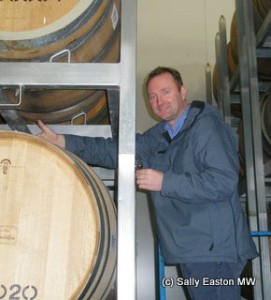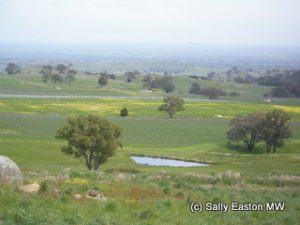Plunkett-Fowles

Sam Plunkett
Plunkett-Fowles arose as a merger of two family wine businesses in 2005, both located in the rather rugged, granitic region of Strathbogie Ranges, remote even though it is only around 130km north of Melbourne. The business is run by chief winemaker Sam Plunkett, and CEO Matt Fowles.
Strathbogie is one of Australia’s cooler growing regions. With an HDD 1460 and an MJT of 20.7°C (James Halliday, Wine Atlas of Australia, 2006) it is little wonder that riesling is a favoured grape variety, and producers such as Domaine Chandon have a vineyard in the area, growing chardonnay and pinot noir, much going to their sparkling wine.
In one of those quirks of Australian viticulture, shiraz is also making a more than respectable name for itself. Plunkett summed up his region thus: “Strathbogie is a 400 million year old mountain range. It’s two key features are firstly elevation, and secondly, granite.” Elevation certainly plays a cooling role, with vineyards from around 200 to 600m above sea level, amidst granite tors and boulders.
Plunkett added “a lot of cool climate Australia is coastal – maritime, with high rainfall and the mould and disease pressure” that that brings, but “Strathbogie has less rainfall, it’s continental. We get things ripe because there is less [disease] pressure to pick.” And in terms of ripening, Plunkett said Strathbogie is 1-2 weeks behind the Yarra Valley.

Strathbogie Ranges
The soils are infertile though, Plunkett said it’s mostly “timber land and sheep farming.” But in 1968, Plunkett’s father planted 30 grape varieties across three acres of their farm, though commercial plantings had to wait till 1980. Now, the two wineries have 500 acres (200 hectares) of vineyard, and also make wine under contract for around 20 clients, half of whom grow grapes in Strathbogie Ranges. In any given year, Plunkett said “we crush between 2,300 and 4,500 tonnes.”
Plunkett-Fowles are also the makers of the quirkily-named Ladies Who Shoot Their Lunch range of wines, available, in the UK, through wine merchant Naked Wines for around £15 a bottle, for riesling, chardonnay, shiraz.
Plunkett is a firm believer in getting his wines to express the site as best they can: “we don’t use yeast which will influence the flavour, and we don’t use too much new oak which will mask the place.” Though he added “it will be a decade and more before we get a sense of what Strathbogie Ranges is” in terms of site expression.
As well as ‘Ladies Who Shoot Their Lunch, which Plunkett regards as something of branding phenomenon, the winery makes the ~AUD$25 Stone Dwellers range (granite boulders in the landscape), the ~AUD15 490m (the altitude of the farm), plus flagship wines The Rule and The Exception.
Tasting notes, in situ, October 2010
Plunkett-Fowles, Stonedwellers sauvignon blanc 2010
Grassy, aromatic, herby. Residual sugar was a bit too high for me (5g/l), I thought it made the wine a bit loose.
Plunkett-Fowles, Stonedwellers riesling 2010
However, in the riesling, 6g/l of residual sweetness created the perfect balance, with pithy lemon zest; light, bright, and with intense apple and lime. Vg
Plunkett-Fowles, Stonedwellers riesling 2008
Lime and petrol combo, with some nice weight developing. Light, steely, with gentle savoury notes, and good intensity.
Plunkett-Fowles, Ladies Who Shoot Their lunch riesling 2009
A third in old oak for texture, plus a tiny amount of gewürztraminer. This was not my style, petrol development on the nose, fuller and fatter style.
Plunkett-Fowles, Stonedwellers Shiraz 2007
Black pepper spice, dense and gravelly, then with smooth, supple attack and texture. Dark brambly pepper, dense, sweet fruit, smooth, characterful and good.
Plunkett-Fowles, Ladies Who Shoot Their Lunch Shiraz 2008
Spicy plum and red fruit aromas, hints of new oak aromatics in a rounded, supple, less complex wine, undoubtedly more wide appealing for that.
Plunkett-Fowles, The Rule Reserve Shiraz 2008
Deep, smooth texture, very fine tannins. Fine, sophisticated, new oak absorbed completely in ripe, perfumed, dark, black gravelly fruit. Vg
My research visit to Australia in October 2010 was sponsored by Wine Australia.



